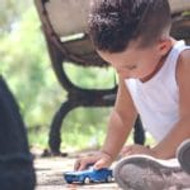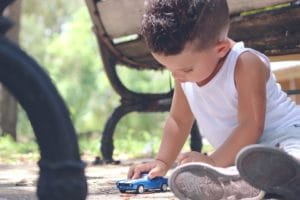Scientist, Psychologist, Explorer
Posted by Brainspring on 21st Jun 2017
When I watch my two-year-old son play with his toys I usually admire his efforts and think to myself how cute he is. But when I stop to think about it, I am amazed at how his play is really his job. Young children have an important job that they take very seriously. Through play children make connections and inferences, test hypotheses, explore sensation, discover the power they possess to affect other people, and use theatrical scenes to tell the story of their world as they understand it. What seems to be merely “fun” is actually a hugely important process of discovery
My son is constantly making connections between new things and what is already familiar, and he uses that information to make inferences. One of his current obsessions is with speed bumps. There are two speed bumps we have to drive over to get to our apartment, and riding in his car seat he began to notice this regular occurrence. “Bum! Bum!” he said joyfully. Soon many other things were bum bums – anything that caused his toy car to go bum bum – the bump going from the tile floor to the carpet, the bumps in between each tile, or the small space between each cushion on the couch. He made a connection between his toy cars and our larger car and then inferred that many other things could behave the same way as our driveway speed bumps.
Children are mini scientists as they test out cause and effect with their toys and mini psychologists as they explore their own sensations and discover how their actions affect others. This morning I watched my son test the following hypothesis: “I think that every time I throw a toy car it will drop to the floor.” He then stood on a chair and systematically tossed each of his 10 cars on to the floor. He tossed them one at a time with about the same arm motion every time. As each car made a satisfying thwap he paused to stare at it and consider what had happened before continuing with the experiment. The mini psychologist comes out when he spends time analyzing the sensation of wonderfully squishy crackers after dunking them in milk, or when he watches the behavior of mom and dad while performing various acts of negative behavior. “Which of these behaviors will make mom the most angry?” And so he tests it—falling on the floor, throwing things, crying, running away, kicking during diaper changes—and waits to see what behavior mom will display in response.
By far my favorite thing to watch my son do is act out the story of his world as he understands it. He doesn’t have a ton of language yet, but regardless of limitations, his toy cars have long talks with each other. His tiny baby voice mimics the inflections and tone he hears in adult conversation so that even though hardly any real words are spoken, I feel like I’ve just listened in on a theatrical production. My other favorite occurrence of this is in his crib at night. After loud protestations about being put in the baby prison, he turns to his teddy bear and starts telling his fluffy friend all that happened in his day. “Bum! Bum!” he says. “Brrrrr!!!” (big trucks) You!! (love you) Ma! Da! Bye-bye!” Real words are intermixed with lots of baby nonsense words but all for the purpose of processing through the events of his day.
When we were little my dad often joked with us when he came home: “Did you work hard all day? Did you play and play?” Children work hard to explore their world through play which is the same thing as saying children spend their day being scientists, psychologists, explorers, and discoverers.
Audrey Bon, A.B.Ed.
Audrey is a tutor at Brainspring Learning Center in Plymouth.

